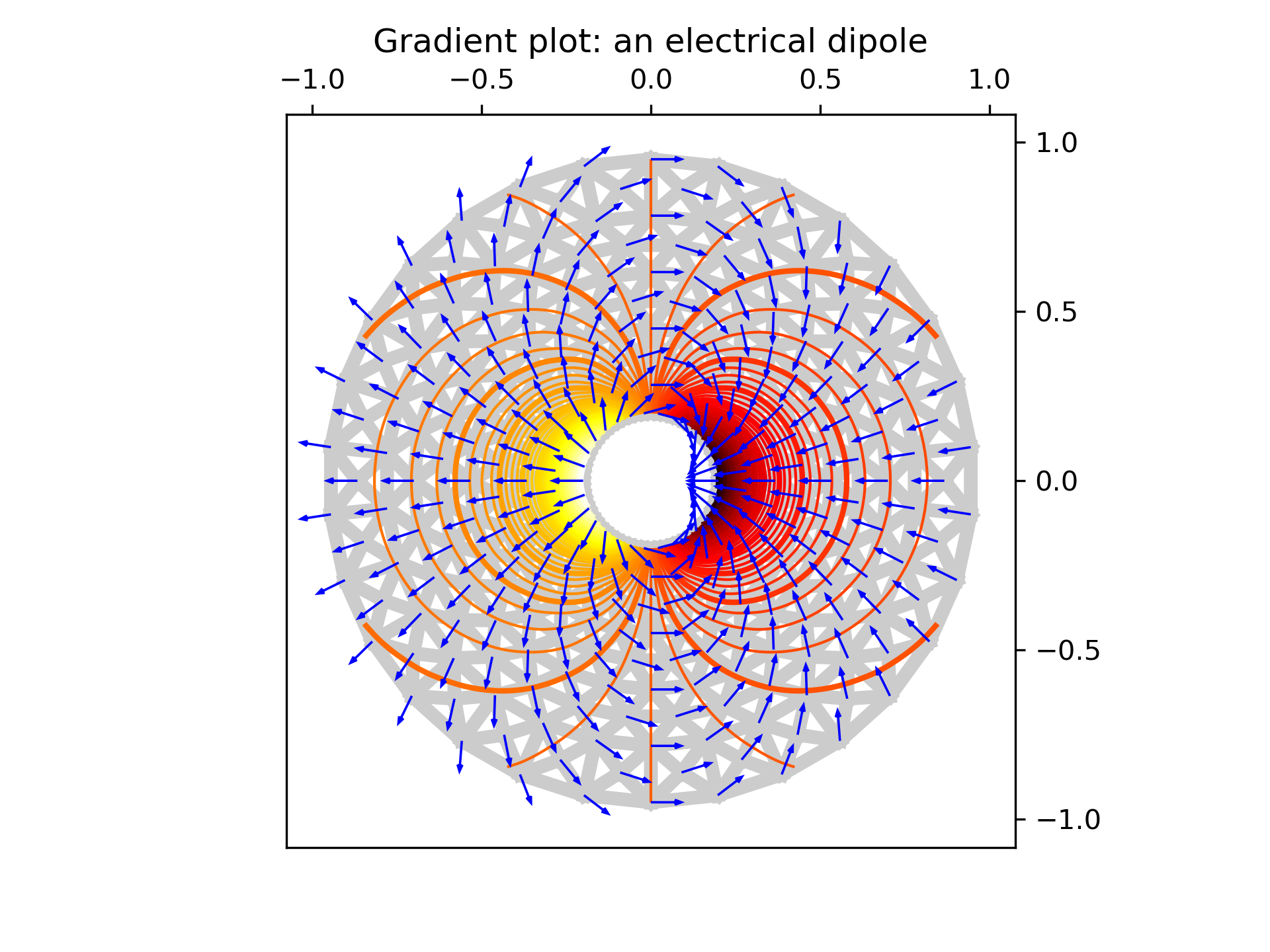>>> """
================
Trigradient Demo
================
Demonstrates computation of gradient with
`matplotlib.tri.CubicTriInterpolator`.
"""
... from matplotlib.tri import (
... Triangulation, UniformTriRefiner, CubicTriInterpolator)
... import matplotlib.pyplot as plt
... import numpy as np
...
...
... # ----------------------------------------------------------------------------
... # Electrical potential of a dipole
... # ----------------------------------------------------------------------------
... def dipole_potential(x, y):
... """The electric dipole potential V, at position *x*, *y*."""
... r_sq = x**2 + y**2
... theta = np.arctan2(y, x)
... z = np.cos(theta)/r_sq
... return (np.max(z) - z) / (np.max(z) - np.min(z))
...
...
... # ----------------------------------------------------------------------------
... # Creating a Triangulation
... # ----------------------------------------------------------------------------
... # First create the x and y coordinates of the points.
... n_angles = 30
... n_radii = 10
... min_radius = 0.2
... radii = np.linspace(min_radius, 0.95, n_radii)
...
... angles = np.linspace(0, 2 * np.pi, n_angles, endpoint=False)
... angles = np.repeat(angles[..., np.newaxis], n_radii, axis=1)
... angles[:, 1::2] += np.pi / n_angles
...
... x = (radii*np.cos(angles)).flatten()
... y = (radii*np.sin(angles)).flatten()
... V = dipole_potential(x, y)
...
... # Create the Triangulation; no triangles specified so Delaunay triangulation
... # created.
... triang = Triangulation(x, y)
...
... # Mask off unwanted triangles.
... triang.set_mask(np.hypot(x[triang.triangles].mean(axis=1),
... y[triang.triangles].mean(axis=1))
... < min_radius)
...
... # ----------------------------------------------------------------------------
... # Refine data - interpolates the electrical potential V
... # ----------------------------------------------------------------------------
... refiner = UniformTriRefiner(triang)
... tri_refi, z_test_refi = refiner.refine_field(V, subdiv=3)
...
... # ----------------------------------------------------------------------------
... # Computes the electrical field (Ex, Ey) as gradient of electrical potential
... # ----------------------------------------------------------------------------
... tci = CubicTriInterpolator(triang, -V)
... # Gradient requested here at the mesh nodes but could be anywhere else:
... (Ex, Ey) = tci.gradient(triang.x, triang.y)
... E_norm = np.sqrt(Ex**2 + Ey**2)
...
... # ----------------------------------------------------------------------------
... # Plot the triangulation, the potential iso-contours and the vector field
... # ----------------------------------------------------------------------------
... fig, ax = plt.subplots()
... ax.set_aspect('equal')
... # Enforce the margins, and enlarge them to give room for the vectors.
... ax.use_sticky_edges = False
... ax.margins(0.07)
...
... ax.triplot(triang, color='0.8')
...
... levels = np.arange(0., 1., 0.01)
... ax.tricontour(tri_refi, z_test_refi, levels=levels, cmap='hot',
... linewidths=[2.0, 1.0, 1.0, 1.0])
... # Plots direction of the electrical vector field
... ax.quiver(triang.x, triang.y, Ex/E_norm, Ey/E_norm,
... units='xy', scale=10., zorder=3, color='blue',
... width=0.007, headwidth=3., headlength=4.)
...
... ax.set_title('Gradient plot: an electrical dipole')
... plt.show()
...
... #############################################################################
... #
... # .. admonition:: References
... #
... # The use of the following functions, methods, classes and modules is shown
... # in this example:
... #
... # - `matplotlib.axes.Axes.tricontour` / `matplotlib.pyplot.tricontour`
... # - `matplotlib.axes.Axes.triplot` / `matplotlib.pyplot.triplot`
... # - `matplotlib.tri`
... # - `matplotlib.tri.Triangulation`
... # - `matplotlib.tri.CubicTriInterpolator`
... # - `matplotlib.tri.CubicTriInterpolator.gradient`
... # - `matplotlib.tri.UniformTriRefiner`
... # - `matplotlib.axes.Axes.quiver` / `matplotlib.pyplot.quiver`
...

